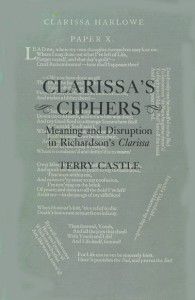
Clarissa’s Ciphers
(Reviewers’ comments)
“Terry Castle’s work on Samuel Richardson came at a time when penetrating Clarissa was a favorite male post-structuralist pastime, and Castle’s work on sexuality and gender has helped make feminist and queer intellectual projects acceptable.”–Signs
“Richardson’s novel enjoyed something of a critical moment in the early 1980s, with several of the brightest minds in eighteenth-century studies fixing their high beams on Clarissa. The dustjacket of Terry Eagleton’s 1982 The Rape of Clarissa announced Eagleton’s ambition to ‘reclaim Richardson for our time’; in Eagleton’s analysis, Richardson’s novel presented the story of the downtrodden oppressed (Clarissa) rising up against the aristocratic oppressor (Lovelace). Clarissa, for Eagleton, was a shot fired by the restive middle class against the corrupt and depleted nobility. In Terry Castle’s Clarissa’s Ciphers, also published in 1982, the focus was on Clarissa’s suffering at the hand of Lovelace, and on her ingenious efforts to thwart his vile machinations. Both critics positioned themselves on the side of the angels, seeing it as their duty to counter a whole raft of past critics who, when they were not blaming the victim (Richard Cohen: ‘[A]t a deep and primitive level there is a sense in which Clarissa both asks and deserves to be raped’) were describing the rape with a clinical hauteur. [....] There was a take-back-the-night fervor to Eagleton’s and Castle’s discussions of Clarissa’s rape; they were particularly incensed by William Warner’s celebration of Lovelace as ‘the heroic practitioner of a Nietzschean style of subversive interpretation’ and by his insistence that the rape of Clarissa had become ‘something extravagant, overdetermined, pleasurable.’” –Judith Pascoe, Hudson Review
